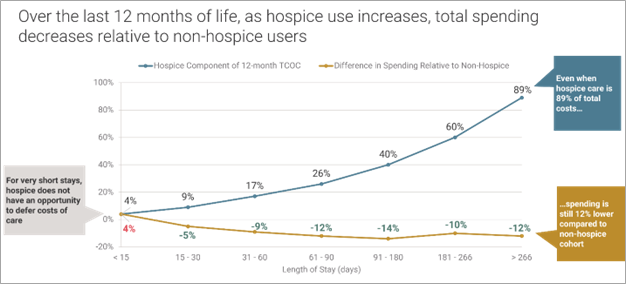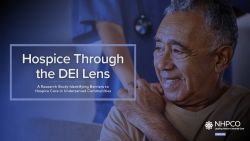
For Immediate Release
March 22, 2023
New Research Shows Hospice Care Reduces Medicare Costs
Hospice Care Contributed to $3.5 Billion in Medicare Savings in One Year
Better Outcomes Together with Medicare Savings Demonstrate Hospice’s Value
(Alexandria, VA and Washington, DC) – New research shows that patients’ use of hospice care contributed to $3.5 billion in savings for Medicare in 2019, while providing multiple benefits to patients, families, and caregivers. The study, conducted by NORC at the University of Chicago, is one of the most comprehensive analyses of enrollment and administrative claims data for Medicare patients covered by Medicare Advantage and Traditional Medicare. The study was funded by the National Association for Home Care & Hospice (NAHC) and the National Hospice and Palliative Care Organization (NHPCO).
Key findings from the study include the following:
-
-
- NORC estimates that Medicare spending for those who received hospice care was $3.5 billion less than it would have been had they not received hospice care.
- In the last year of life, the total costs of care to Medicare for beneficiaries who used hospice was 3.1 percent lower than for beneficiaries who did not use hospice.
- Hospice is associated with lower Medicare end-of-life expenditures when hospice lengths of stay are longer than 10 days. In other words, earlier enrollment in hospice reduces Medicare spending even further.
- Hospice stays of six months or more result in savings for Medicare. For those who spent at least six months in hospice in the last year of their lives, spending was on average 11 percent lower than the adjusted spending of beneficiaries who did not use hospice.
- At any length of stay, hospice care benefits patients, family members, and caregivers, including increased satisfaction and quality of life, improved pain control, reduced physical and emotional distress, and reduced prolonged grief and other emotional distress.
-
“Multiple studies over many years have confirmed what hospice providers know: hospice care improves the end-of-life journey for patients and families. This new NORC study shows that in addition to improving care, hospice saves tax dollars,” said NHPCO COO and Interim CEO, Ben Marcantonio. “With questions about the future of the Medicare Trust Fund, policymakers and healthcare leaders are working to make changes that increase value and reduce costs, while putting patients at the center and delivering more care at home. That’s what hospice has done for more than 40 years. This research, along with American’s growing demand for hospice care, shows that any effort to save money by reducing hospice expenses will backfire. In fact, we should increase the investment in hospice, both to save money and to increase the quality of end-of-life care.”
“One important finding of this research is that generally as hospice lengths of stay increased, so did Medicare savings. One of the main points of feedback we hear from families of hospice patients is ‘We only wish we had chosen hospice earlier.’ Hospice stays of less than 15 days don’t give enough time for patients and families to benefit fully from the person-centered care that hospice provides. Yet, 50 percent of hospice patients receive 17 days or less of hospice care,” added NAHC President, William A. Dombi. “Policymakers, health systems, and healthcare payers reading this groundbreaking research should see an opportunity to support patient interests and family wellbeing, while also driving savings for Medicare, by ensuring timely patient access to hospice care.”
“Our research shows that hospice is an essential component of end-of-life care and is relevant in any discussion about the future of Medicare solvency,” said Dianne Munevar, Vice President of Health Care Strategy at NORC. “For patients and families, our research provides one more reason to have conversations about end-of-life care before it is needed and to seriously consider hospice so that when the time comes their wishes and preferences are respected.”
 Methodology
Methodology
NORC compared the utilization of health services and costs of care for the last 12 months of life of more than 500,000 Medicare beneficiaries who died in 2019 and had a hospice stay immediately prior to death to more than 457,000 Medicare decedents who had similar risk profiles but did not have a hospice stay. The findings were jointly published by NAHC and NHPCO.
More information
To access the full report and related materials, see nahc.org/hospiceworks or nhpco.org/hospiceworks.
###
About NAHC
The National Association for Home Care & Hospice (NAHC) is the voice of home care and hospice. NAHC represents the nation’s 33,000 home care and hospice providers, along with the more than two million nurses, therapists, and aides they employ. These caregivers provide vital services to Americans who are aged, disabled, and ill. Some 12 million patients depend on home care and hospice providers, who depend on NAHC for the best in advocacy, education, and information. NAHC is a nonprofit organization that helps its members maintain the highest standards of care. To learn more, visit nahc.org.
About NHPCO
The National Hospice and Palliative Care Organization (NHPCO) is the nation’s largest and oldest membership association for providers who care for people affected by serious and life-limiting illness. Our members deliver and expand access to high-quality, person-centered interdisciplinary care to millions of Americans. NHPCO provides education and resources to support that mission. Together with our advocacy partner, the Hospice Action Network (HAN), we serve as the leading voice advancing public policy to improve serious-illness and end-of-life care, while our CaringInfo program provides free resources to educate and empower patients and caregivers. nhpco.org
About NORC at the University of Chicago
NORC at the University of Chicago conducts research and analysis that decision-makers trust. As a nonpartisan research organization and a pioneer in measuring and understanding the world, we have studied almost every aspect of the human experience and every major news event for more than eight decades. Today, we partner with government, corporate, and nonprofit clients around the world to provide the objectivity and expertise necessary to inform the critical decisions facing society. www.norc.org

